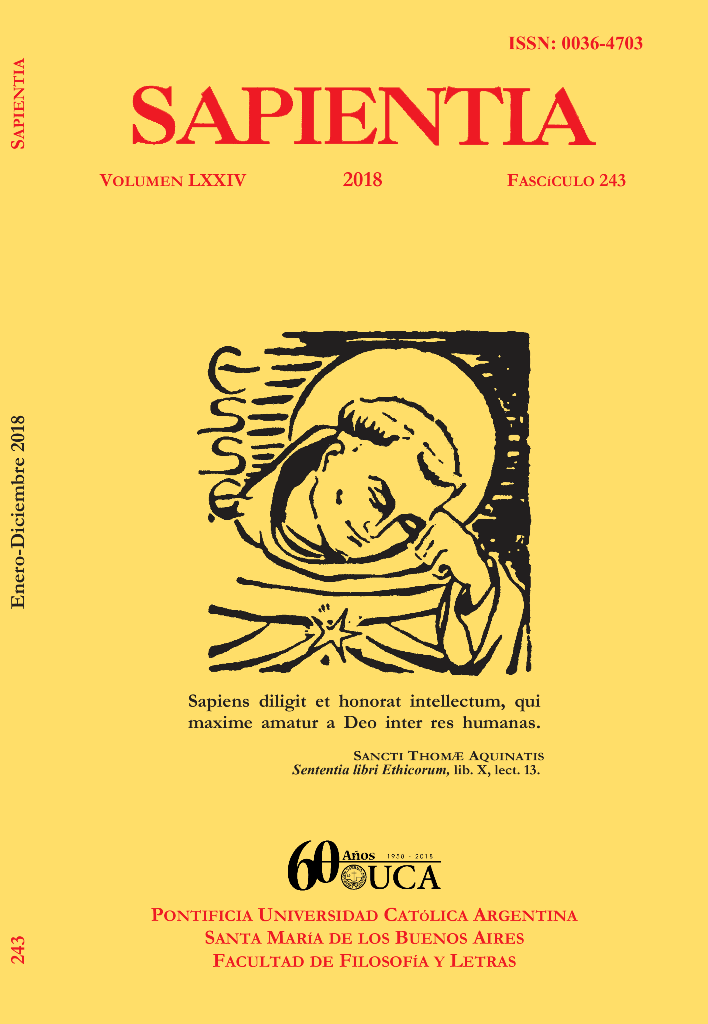Intencionalidad e inmaterialidad en Santo Tomás de Aquino
Palabras clave:
especie – intencionalidad – inmaterialidad – conocimiento – Santo Tomás de AquinoResumen
Se argumenta a favor de la tesis tomista de que la esencia del conocimiento es la inmaterialidad, en contra de un gran sector del tomismo contemporáneo que prefiere radicar la esencia del conocimiento en la intencionalidad. Hay dos partes en este ensayo: una histórica y la otra sistemática. La parte histórica es un intento de identificar el origen del lenguaje intencionalista en el tomismo contemporáneo. A continuación, la parte sistemática, donde se argumenta que el concepto tomista de intencionalidad no sólo no coincide con el moderno, sino que está relegado a un segundo plano en relación a la noción de inmaterialidad. Varias razones se dan para ello, primero, porque el conocimiento por intencionalidad es simplemente un tipo de conocimiento, no todo conocimiento es por intencionalidad, y además es un conocimiento imperfecto; segundo porque la intencionalidad es un efecto causal; tercero, porque la intencionalidad no es una propiedad del acto de conocimiento, sino de la forma.
Intencionalidad e inmaterialidad en Santo Tomás de Aquino
Descargas
Citas
ANSCOMBE, GERTRUDE ELIZABETH M., y GEACH, PETER T., Three Philosophers, Oxford, Basil Blackwell, 1961.
ARISTOTELES, Obra Completa, Madrid, Editorial Gredos, 1984-2004. Especialmente los libros, Sobre el Alma, y Tratados breves de historia natural.
BALTUTA, E., “From Intentionality to Immateriality. The Mark of the Cognitive for Thomas Aquinas”, Transylvania Review, 23, 1, 2014, pp. 62-77.
BLACK, DEBORAH L., «Intentionality in Medieval Arabic Philosophy», Later Medieval Perspectives on Intentionality, en Quaestio 10, 2010.
BRENTANO, FRANZ, Psychologie vom empirischen Standpunkt, Hamburg, Felix Meiner Verlag, 1973.
BROCK, STEPHEN, “Intentional being, natural being, and the first-person perspective in Thomas Aquinas”, The Thomist 77 (2013), 103-133.
DUMMET, MICHAEL, The Origins of Analytic Philosophy, Boston, Harvard University Press, 1996.
EHRENFELS, CHRISTIAN, Über Gestaltqualitäten, en: Vierteljahrsschrift für wissenschaftliche Philosophie, 14, Graz, 1890.
CHISHOLM, RODERICK, Brentano and Meinong Studies, Amsterdam, Editions Rodopi B.V., 1982.
— Perceiving: A Philosophical Study, Ithaca, Cornell University Press, 1957
FABRO, CORNELIO, La Fenomenologia della percezione, Milano, Vita e Pensiero, 1941.
— Percezione e pensiero, Milano, Vita e Pensiero, 1941.
— La svolta antropologica di Karl Rahner, en Opere Complete 25, Roma, Editrice dei Verbo Incarnato, 2011.
GEACH, PETER T., «Form and Existence», Proceedings of the Aristotelian Society, 55, 1954-1955.
HALDANE, JOHN, «Mind-World Identity Theory and the Anti-Realist Challenge», Reality, Representation and Projection, editor J. Haldane y C. Wright, Oxford, Oxford University Press, 1993.
— «Forms of Thought», The Philosophy of Roderick Chisholm, editor Lewis Edwin Hahn, Illinois, Open Court, 1997.
— «Realism with a Metaphysical Skull», Hilary Putnam: Pragmatism and Realism, editor James Conant y Urszula Zeglen, London, Routledge, 2002.
HUSSERL, EDMUND, Ideas: General Introduction to Pure Phenomenology, "Autor's Preface to the English Edition" London 1931.
— Investigaciones Lógicas, volumen 2, Traducción de Manuel García Morente y José Gaos, Madrid, Alianza Editorial, 2006.
IONNIS A SANCTO THOMA, Cursus thelogicus, Parisiis, Desclée et Sociorum, 1934.
JACQUETTE, D., “Brentano’s Concept of Intentionality”, en The Cambridge Companion of Intentionality, al cuidado de Dale Jacquette, New York, Cambridge University Press, 2004.
KENNY, ANTHONY, «Intentionality: Aquinas and Wittgenstein», The Legacy of Wittgnestein, New York, Basil Blackwell, 1984.
— Aquinas on Mind, London, Rutledge, 1993.
KLIMA, GIULA, “Intentional Transfer in Averroes, Indifference of Nature in Avicena, and the Representationalism of Aquinas,” Universal Representation, and the Ontology of Individuation, G. Klima y A. Hall (editores), Newcastle upon Tyne, Cambridge Scholars Publishing, 2011
LISSKA, ANTHONY, Aquinas’s Theory of Perception, An Analytic Reconstruction, Oxford, Oxford University Press, 2016.
MEINONG, ALEXIUS, Über Gegenstandstheorie, en Alexius Meinong Gesamtausgabe, al cuidado de Rudolf Haller, Graz - Austria, Akademische Druck- u. Verlagsanstalt, 1971 volumen 2.
MILLÁN PUELLES, ANTONIO, La Estructura de la Subjetividad, Madrid, Ediciones Rialp, 1967.
MOSER, ROBBIE, «Thomas Aquinas, esse intentionale, and the cognitive as such», The Review of Metaphysics, 64, 2011.
PASNAU, ROBERT, Theories of Cognition, New York, Cambridge University Press, 1997.
PERLER, DOMINIC., Theorien der Intentionalität im Mittelalter, Frankfurt, Klosterman, 2004.
SAN AGUSTÍN, De trinitate libri quindecim, Opera Omnia, Patrologia Latina 42.
SANGUINETI, JUAN JOSE, “La especie cognitiva en Tomás de Aquino”, Topicos, Revista de Filosofía, 40, 2011, pp. 63-103.
SANTO TOMÁS DE AQUINO, Opera Omnia, editado y puesto en versión electrónica por BUSA, ROBERTO, SJ, mantenido por ALARCÓN, ENRIQUE, en la Universidad de Navarra, España. Disponible en http://www.corpusthomisticum.org/iopera.html. Fecha de consulta: 7/15/2018.
SCARPELLI-CORY, THERESE, «Knowing as Being? A Metaphysical Reading of the Identity of Intellect and Intelligibles in Aquinas», American Catholic Philosophical Quarterly, 91, 3, 2017.
SPRUIT, LEEN, Species intelligibilis: From Perception to Knowledge, 2 volúmenes., Leiden, Brill, 1994.
VELARDE--MAYOL, VÍCTOR, On Brentano, New York, Wadsworth, 2000.
__________. Ser y Objeto, Madrid, Síntesis, 2016.
Descargas
Publicado
Cómo citar
Número
Sección
Licencia






